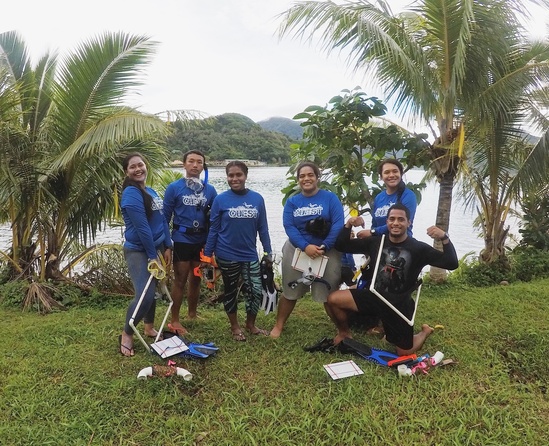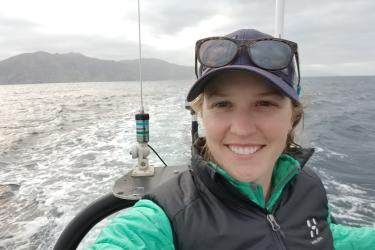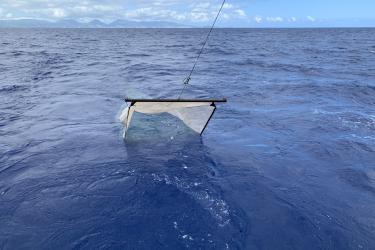I arrived into Pago Pago late Monday night. The humid, sweet air made my clothes stick to my skin and I was drenched in sweat by the time I retrieved my bag from baggage claim. I was happily greeted by Jeff Kuwabara, my colleague from the Marine Option Program at the University of Hawaiʻi at Mānoa, and by the time we drove up to our campsite it was close to midnight. I dumped my luggage in the tent, laid out my sleeping bag, and conked out for the night.
Waking up to the sounds of birds, I leaned my head out of the tent to take a look at my surroundings. A few feet away laid a beautiful lagoon reflecting the morning light. Overhead, palm trees swayed in the gentle breeze. I could hear the students beginning to rustle in their tents and figured it was time to get up and meet the crew.
Upon crawling out of my tent, I was greeted by sleepy-eyed students, slowly getting ready for the day. They were there to participate in an intensive, one-week course on Quantitative Underwater Ecological Surveying Techniques—lovingly known as QUEST. A second-year student, Raijeli (“Jeli”) Toanivere, gave me a big hug, welcoming me to American Samoa. Jeli is originally from Fiji but moved to American Samoa in 2015. As a second-year student, she was well versed in the concepts and expectations of QUEST and was working as an intern to help the first-year students with their understanding of the concepts, as well as data analysis and final projects.
![Course instructor Kelley Anderson Tagarino gives a dive briefing to QUEST students at the start of the day. (Photo: Ali Bayless)]()
Course instructor Kelley Anderson Tagarino gives a dive briefing to QUEST students at the start of the day. (Photo: Ali Bayless)
QUEST was founded in the 1980s in Hawaii to train students in underwater methods for surveying coral reefs. In 2011, Hawaiʻi Sea Grant initiated a QUEST program in American Samoa through the American Samoa Community College (ASCC). The course is led by Kelley Anderson Tagarino, a University of Hawaiʻi Sea Grant extension agent and ASCC faculty, and Meagan Curtis, the marine science coordinator at the college. These two have been running the QUEST program together since 2017 and are completely dedicated to the success of their students. At QUEST, students learn to identify over 150 local marine species; learn survey techniques for fish, coral, and limu (algae); and conduct their own research projects using this knowledge. Students spend the mornings in the water conducting surveys, and afternoons and evenings working on data offload and analysis.
![On left: Raijeli (Jeli) Toanivere lays a transect for coral cover survey. (Photo: Jeff Kuwabara) On right: Aveipepa Fua recording data in the field. (Photo: Ali Bayless)]()
Raijeli (Jeli) Toanivere lays a transect for coral cover survey. (Photo: UH Marine Option Program/Jeff Kuwabara)
Fuamai (“Mai”) Ativalu Tago, a second year student like Jeli, recalled her first QUEST experience: “I learned a lot,” she said. “I learned about the different types of fish and corals, which I am very interested in now.” And QUEST is just the beginning for Mai. “I am hoping to graduate from community college then continue on with my studies to get a bachelor’s degree in marine science at UH Hilo… hopefully to get a job with a marine science agency.” And she will be well prepared to do so.
The hands-on learning in QUEST ensures students who earn their QUEST certificate are well trained in important survey techniques that make them desirable candidates for employment at natural resource management agencies. It also exposes them to potential careers in the field of marine science, providing support and inspiration. “It has given me more knowledge on what to pursue in the future,” Jeli said. “Now I am planning to transfer out to UH Mānoa to pursue my bachelor’s degree in marine biology.”
Aveipepa Fua recording data in the field. (Photo: Ali Bayless)
Many QUEST participants from previous years have gone on to get bachelor’s degrees and then return to American Samoa for jobs with local agencies. Of the 50 past QUEST participants to date, 45 of them have earned their QUEST certificate, and 95% of those are continuing their education in marine science or working in a related field. Many have secured jobs at the American Samoa Environmental Protection Agency, the National Park of American Samoa, and the American Samoa Governor’s Coral Reef Advisory Group. In addition, QUEST has trained local staff in marine resource positions to improve their survey and data management skills. One of those local staff, Motusaga Vaeoso, recently became the very first American Samoan appointed as a NOAA Coral Reef Fellow for American Samoa.
Inspirational guest lectures from alumni like Vaeoso motivated QUEST students to follow similar paths. “I want to come back to help out with my community,” Mai said, “to give back.” I have no doubt that these students will use the foundation they have gained through QUEST to go on to successful careers, and for many, this will bring them full circle—back to their island home.
![QUEST students prepare for coral reef surveys at Faga‘alu. (Photo: Ali Bayless)]()
QUEST students prepare for coral reef surveys at Faga‘alu. (Photo: Ali Bayless)
QUEST is supported by the NOAA Marine Education and Training grant, ASCC funds, Nation Science Foundation Advanced Technological Education funds, and donations of equipment and time from local agencies. To learn more about QUEST, please check out our video at https://youtu.be/4dwvgojJZAc or visit www.hawaii.edu/mop/quest.
Meet the Blogger
Ali Bayless is the Outreach & Education Coordinator at the Pacific Islands Fisheries Science Center. She thoroughly enjoyed experiencing QUEST along with the ASCC students and was honored to document their hard work.








